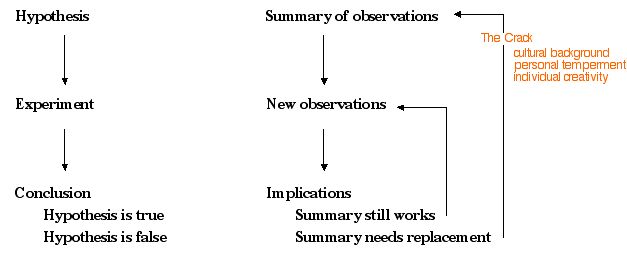Remote Ready Biology Learning Activities has 50 remote-ready activities, which work for either your classroom or remote teaching.
Serendip is an independent site partnering with faculty at multiple colleges and universities around the world. Happy exploring!
Evolution
(and revolution?)
| Traditional | Rethought |
 | |
| Science as body of facts established by specialized fact-generating people and process
Science as successive approximations to Truth
| Science as process of getting it less wrong, potentially usable by and contributed to by everyone
Science as ongoing story telling and story revision based on observations and shared observations, stories and contrasting stories Science as skepticism usable by and empowering anyone at any time about any thing for any purpose |
|
Newtonian Gravity As an Organizing Principle and Its Implications
Such stories in turn raise new questions The solar system as an accident? |
Scientific stories are freqeuntly efforts to summarize the widest possible range of observations, always motivate new observations and hence new stories, should never be understood as "authoritative" or "believed in", do not compete with or invalidate other stories.
Key issues about scientific stories
|
Which of the following stories do you prefer?
What story to account for existing life forms do you prefer? Why? Put your thoughts in the institute forum area to help others think about this too.
Clarifying the Issues | |
|
"The Catholic Church, while leaving to science many details about the history of life on earth, proclaims that by the light of reason the human intellect can readily and clearly discern purpose and design in the natural world, including the world of living things.
Evolution in the sense of common ancestry might be true, but evolution in the neo-Darwinian sense -- an unguided, unplanned process of random variation and natural selection -- is not. Any system of thought that denies or seeks to explain away the overwhelming evidence for design in biology is ideology, not science. Consider the real teaching of our beloved John Paul ... To all these indications of the existence of God the Creator, some oppose the power of chance or of the proper mechanisms of matter. To speak of chance for a universe which presents such a complex organization in its elements and such marvelous finality in its life would be equivalent to giving up the search for an explanation of the world as it appears to us. In fact, this would be equivalent to admitting effects without a cause. It would be to abdicate human intelligence, which would thus refuse to think and to seek a solution for its problems.'' Now at the beginning of the 21st century, faced with scientific claims like neo-Darwinism and the multiverse hypothesis in cosmology invented to avoid the overwhelming evidence for purpose and design found in modern science, the Catholic Church will again defend human reason by proclaiming that the immanent design evident in nature is real. Scientific theories that try to explain away the appearance of design as the result of ''chance and necessity'' are not scientific at all, but, as John Paul put it, an abdication of human intelligence." ... Christopher Schonborn, cardinal archbishop of Vienna, New York Times, 7 July 2005 |
Science is NOT "ideology", does not make "claims", has not been "invented to avoid overwhelming evidence", has no commitment to "explain away", is not "an abdication of human intelligence" nor does it "refuse to think and to seek a solution for its problems"
Science is not in the business of either "proclaiming that the immanent design evident in nature is real" nor denying that claim. Nor is it "radically opposed" to "the truth of faith about creation". There is no "final" in science, and hence no conflict with other forms of story telling except insofar as such stories claim finality or priority.
Science is a tool to help one become better at thinking for oneself
|
|
"What to do...what to do??? ... Much of what I do instinctively, or unconsciously has to do with how I was handled at home and in school when I was growing up. I wasnt always given a choice. I did what I was told and that was that! Children should be seen and not heard! Im from the "old school generation" and thats how I run my classroom." ... Clete
"As a new teacher the conversations today were very ... interesting! When I think about the behavior of my students I firmly believed that they "will only do what I allow them". So in essence my theory on THEIR BEHAVIOR was rooted in MY BEHAVIOR. So I now am now questioning how my behavior determines their behavior" ... Tiffany "Trying to change things that we have no control over can be the behavior that we must change. We need to make the students more accountable for their behavior" ... Judith " Learning occurs within a structured environment where the players are free to play." ... Teresa |
For students ....
For teachers ....
Pease also remember to introduce yourself and your thoughts about K16 collaborations in the on line forum for tomorrow's minisymposium.
|
| About Serendip | Forum
About Serendip | Forum List |